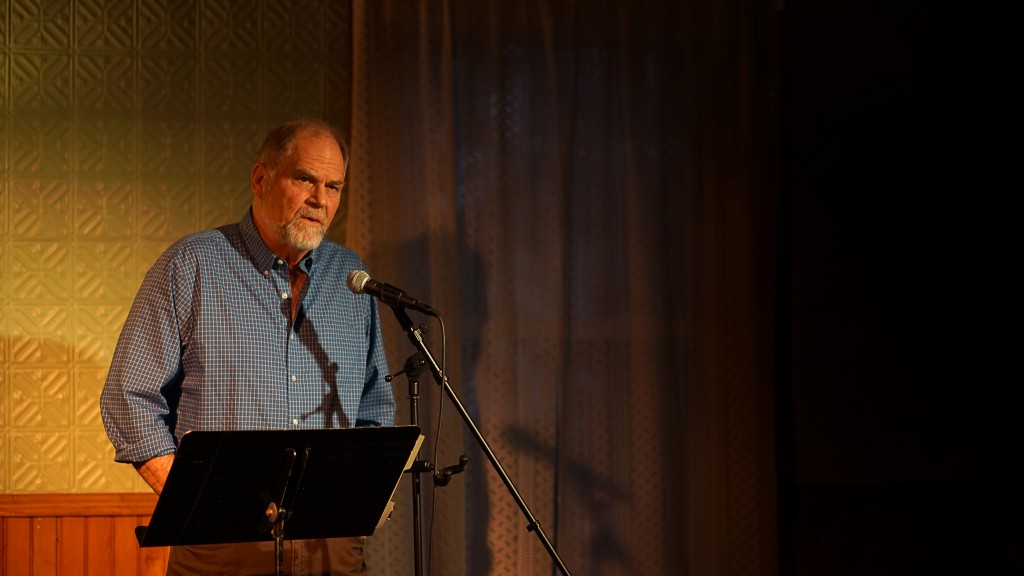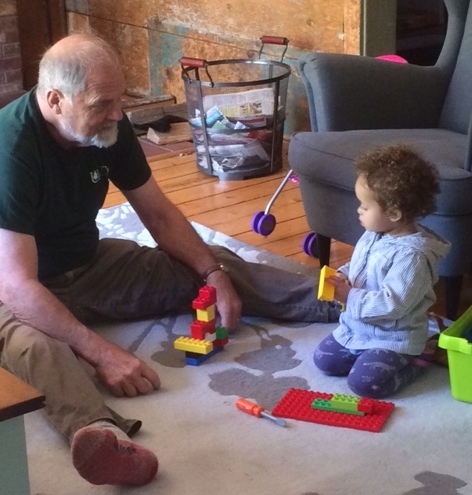
.
Gooka-mol
To watch that band of vultures
coast along their thermal this morning
is to marvel at elegance and composure–
no need to repress old platitudes
about the birds as tokens
of my doom. I don’t even take up the notion,
or rather, if I did,
I’d imagine the doom of some woodland critter.
No, why not be honest? My mind’s on Pete
our dog. Last week, the vet saw a bulge
she didn’t like on his chest.
Tomorrow she’ll cut it out. At a loss,
I think of the vultures’ circling.
I think of etymology,
how some people call those birds revolting,
which literally means they turn us away,
but vulture itself in fact
derives from the verb for turn in Latin.
I’m thinking, you see, of whatever
has nothing to do with a horrible illness.
Schrecklich, I name it, recalling my grandmother’s
Pennsylvania Dutch locutions,
which I likely can’t even spell.
She’d often cry something like Gooka-mol,
which signified Let me see.
Cancer’s taken far too many
creatures who’ve shared their lives with me.
The dog has set my mind on this course,
and I cry it myself, Gooka-mol!
Now the string of birds slips over a knoll.
Where have they gone? I can’t say.
From the height that the birds command, I might
look down on someone behaving this way
and simply conclude, The man is crazy.
It’s only a dog, after all,
and the world’s still wide and rich and lovely.
Granted. It is. Sometimes. Gooka-mol.
.
Solace, Stone
nnnnn–1981
I had lately known a real sorrow:
my young brother– gone. So I set out alone.
Deep in Breaux’s Gore, where I’d never been
until that morning, a headstone leaned.
It was quiet. Never such quiet.
Who can recall that marker but me?
Who is there even to know about it?
Doubtless someone. Hunters must see
the canted slab now and then,
there since 1841.
It only bore one name: John Goodridge,
maybe wife- and childless. Water and sun
had worn its shoulders round.
Home late afternoon, near evening,
I moved from woodpile to shed and back,
less as if I were working than dreaming.
Scents rose in that autumn dusk,
then settled. Odors of duff and rain.
I settled too, in the wheelbarrow’s bed,
like a chunk of oak or mud or a stone
that might passively ride along.
Forty years since I bore witness
to that marker, all the world gone mute.
I’d never known so entire a silence.
I wouldn’t forget it. Never.
I would never not hear that stillness again.
Our little family was set for winter.
We’d soon be soothed by the iron stove’s hum.
I turned from our surfeit of firewood,
And felt at once that a gentle something–
from above the trees overhanging the woodshed
and down through all leaf, all vapor– was falling
into my bone and flesh.
I thought back on the morning, so laden with silence,
as if I could move beyond joy or sadness,
stone-quiet myself, and that could mean solace.
.
A Grandson Sleeps on My Chest
The thread of drool from his lip to my shirt
shows lovely, prismatic, refracting the beams
of this fine warm April sun as I loll on a couch.
Those colors won’t blend with the song
from the Classic Country station I just tuned in.
Hank Williams is lonely, and it damn near kills him.
There’s a dog asleep too, in a circle of light
on the rug, near a pair of rattles, a teething ring,
and a bear that his great grandmother
fabricated years back for this sweet little sleeping child’s father.
Oh I could get going on how that father,
our son, has become such a huge good man
when only yesterday, as the cliché has it,
I held him just this way.
Oh I could get going all right about the absence
of the big-hearted woman who made the bear,
which has twice the bulk of this boy in my arms.
I could fret for the thousandth time that maybe I’ve failed
as man or parent or husband,
but no, I won’t be going that way, or those.
Hank’s midnight train is whining low
While here I hear only a lyrical breathing
and the odd and oddly tuneful infant gurgle.
The scent of the grandson’s crown
wafts up. That’s when all preachments waft up too,
all vanities, worries, to die their sudden deaths.
 Poet & granddaughter Ruthie
Poet & granddaughter Ruthie
—Sydney Lea
.
Sydney Lea is the former Poet Laureate of Vermont (2011-2015). He founded New England Review in 1977 and edited it till 1989. His poetry collection Pursuit of a Wound (University of Illinois Press, 2000) was one of three finalists for the Pulitzer Prize for poetry. Another collection, To the Bone: New and Selected Poems, was co-winner of the 1998 Poets’ Prize. In 1989, Lea also published the novel A Place in Mind with Scribner. Lea has received fellowships from the Rockefeller, Fulbright and Guggenheim Foundations, and has taught at Dartmouth, Yale, Wesleyan, Vermont College of Fine Arts and Middlebury College, as well as at Franklin College in Switzerland and the National Hungarian University in Budapest. His stories, poems, essays and criticism have appeared in The New Yorker, The Atlantic, The New Republic, The New York Times, Sports Illustrated and many other periodicals, as well as in more than forty anthologies. His selection of literary essays, A Hundred Himalayas, was published by the University of Michigan Press in 2012, and Skyhorse Publications released A North Country Life: Tales of Woodsmen, Waters and Wildlife in 2013. His twelfth poetry collection, No Doubt the Nameless, was published this spring by Four Way Books.
.
.
Beautiful trio of poems. Thanks so much to Sydney Lea and Numero Cinq.
I’ve been following this man’s sweet gruffness for decades. Lovely poems.
Gooka-mol is a poem that turns and wheels and hones in on itself like a vulture. Brilliant!
Beautiful!
Deep thanks to you all!